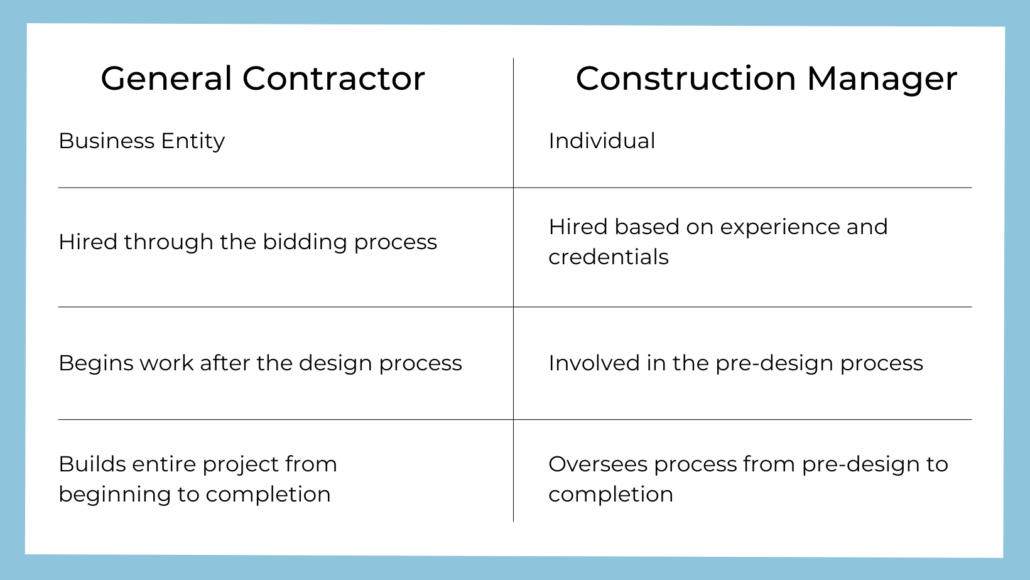
No matter the project, there is often a laundry list of people involved. But what about when it comes to the big boss? What’s the difference between general contracting and construction management? As Procore put it, the two might appear to just be “two sides of the same coin.”
At Competitive Edge, we cover a variety of companies, including roofing, construction, commercial property, commercial real estate, and commercial general liability (CGL) businesses. We recognize that although general contracting and construction management have similarities, they also have fundamental differences. Let’s talk about what sets the two apart.

General Contractors
A general contractor is in charge of day-to-day operations on a job site. In other words, they’re responsible for ensuring the project actually gets completed. General contractors often serve as the liaison between various construction specialists.
General contractors work under a design-bid-build model. A lot goes into creating a bid. Once a project owner asks a general contractor to procure a bid, the general contractor pieces it together by considering the scope of work, project requirements, drawings and renders, subcontractor quotes, all while factoring in their own overhead, fees, and profit margins. The bid is then submitted to the project owner and they select a general contractor from the bids submitted.
It’s important to note that general contractors work for a fixed price. An incentive for general contractors, however? Any unused funds become their additional profit, which may, in some cases, become questionable if a contractor tries to take a cheaper project alternative.
General contractors are then expected to complete their projects at this agreed-upon price. If the project exceeds the general contractor’s bid, it is the contractor’s responsibility to speak with the project manager about allocating additional funds.
A list of potential responsibilities for a general contractor might include the following:
- Hiring and coordinating with subcontractors to determine who will be responsible for each portion of work, when, and at what cost
- Communicating with project owners or clients about the project, its timeline, and their needs
- Working with vendors and suppliers to ensure the correct materials are ordered and delivered on time for use
- Ensuring that mandatory inspections are taking place according to schedule and that all construction is being built to code
- Supervising all parties and smoothing over any problems that might arise
Construction Managers
General contractors and construction managers share relatively similar roles when it comes to boots on the ground, job site work. Their primary difference, however, is in regards to their contract and payment.
Construction managers are typically hired for their qualifications, not their price tag. Unlike a general contractor, a construction manager works on a fixed fee (i.e. working for a percentage of project costs.) Additionally, a construction manager receives no additional profit if the project is completed under budget. Instead, the leftover funds are returned to the project owner.
This considered, it’s in a construction manager’s best interest to go above and beyond in their work, as there’s no room for additional profit. For this reason, some believe a construction manager’s intentions might be better aligned with a project owner than a general contractor.
Additionally, construction managers place higher emphasis on collaboration. As opposed to a general contractor, a construction manager works with a project owner from the beginning to develop a project budget. A budget is created based on the specifics of what the client wants and is less of a ballpark figure than the bid of a general contractor.
Some potential responsibilities of a construction manager include:
- Actively creating the project budget and timeline based on the project owner or client’s specifications
- Hiring low-level leadership within the project team
- Collaborating to ensure the project runs smoothly (i.e. with architects or engineers)
- Walking with the project owner step-by-step to design the project specifics
Two Sides of the Same Coin
Although there is much overlap between the two roles, general contractors and construction managers have their differences as well. The decision to work with one or the other is a preference and is often evaluated on a project-by-project basis.
At Competitive Edge, we recognize it can be extremely difficult to get affordable insurance in the high-risk field of construction. Regardless of whether you’re a general contractor, construction manager, or project owner, contact us today to see how we can help keep you safe.
